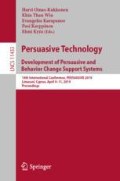Abstract
People often have long-term personal goals regarding health behavior change. Recently, the processes for achieving these goals have begun to be supported through behavior change support systems and especially through their persuasive software features. In a multidisciplinary research project focused on helping micro-entrepreneurs to recover from work-related strain and stress, a persuasive mobile application was developed. For gaining insights about the workings of the system and its persuasive features, we conducted 29 interviews with the system users. We used thematic analysis method with a deductive emphasis for analyzing the interviews. For some, concurrent usage of wearables or other applications led to discarding our application. Users thought that the application was relatively persuasive, but technical issues reduced its persuasiveness noticeably. When functioning properly, self-monitoring and reminders were found to be supportive for users to achieve their goals. Unobtrusiveness was found to increase the persuasiveness of reminders, while self-monitoring always seems to be dependent on the user’s personal needs.
Access this chapter
Tax calculation will be finalised at checkout
Purchases are for personal use only
References
Agarwal, R., Gao, G., DesRoches, C., Jha, A.: Research commentary—the digital transformation of healthcare: current status and the road ahead. Inf. Syst. Res. 21(4), 796–809 (2010)
Goh, J.M., Gao, G., Agarwal, R.: Evolving work routines: adaptive routinization of information technology in healthcare. Inf. Syst. Res. 22(3), 565–585 (2011)
Borrelli, B., Ritterband, L.M.: Special issue on eHealth and mHealth: challenges and future directions for assessment, treatment, and dissemination. Health Psychol. 34(S), 1205 (2015)
Meier, C.A., Fitzgerald, M.C., Smith, J.M.: eHealth: extending, enhancing, and evolving health care. Annu. Rev. Biomed. Eng. 15, 359–382 (2013)
Oinas-Kukkonen, H.: A foundation for the study of behavior change support systems. Pers. Ubiquit. Comput. 17(6), 1223–1235 (2013)
European Commission: Commission Recommendation of 6 May 2003 concerning the definition of micro, small and medium-sized enterprises. Official J. Eur. Union 46 (2003)
Oinas-Kukkonen, H., Harjumaa, M.: Persuasive systems design: key issues, process model, and system features. Commun. Assoc. Inf. Syst. 24(1), 28 (2009)
Ryan, R.M., Deci, E.L.: Self-determination theory and the facilitation of intrinsic motivation, social development, and well-being. Am. Psychol. 55(1), 68 (2000)
Prochaska, J.O., DiClemente, C.C.: The transtheoretical approach. Handb. Psychother. Integr. 2, 147–171 (2005)
Ng, J.Y., et al.: Self-determination theory applied to health contexts: a meta-analysis. Perspect. Psychol. Sci. 7, 325–340 (2012)
Halttu, K., Oinas-Kukkonen, H.: Persuading to reflect: role of reflection and insight in persuasive systems design for physical health. Hum.–Comput. Interact. 32(5–6), 381–412 (2017)
King, N.: Using interviews in qualitative research. In: Cassel, C., Gillian, S. (eds.) Essential Guide to Qualitative Methods in Organizational Research. SAGE, London (2004)
Braun, V., Clarke, V.: Using thematic analysis in psychology. Qual. Res. Psychol. 3(2), 77–101 (2006)
Vaismoradi, M., Turunen, H., Bondas, T.: Content analysis and thematic analysis: implications for conducting a qualitative descriptive study. Nurs. Health Sci. 15(3), 398–405 (2013)
Karppinen, P., et al.: Persuasive user experience in health behavior change support system: a 12-month study for prevention of metabolic syndrome. Int. J. Med. Inform. 96, 51–61 (2016)
Nowell, L.S., Norris, J.M., White, D.E., Moules, N.J.: Thematic analysis: striving to meet the trustworthiness criteria. Int. J. Qual. Meth. 16(1) (2017). https://doi.org/10.1177/1609406917733847
King, N.: Using templates in the thematic analysis of text. In: Cassel, C., Gillian, S. (eds.) Essential Guide to Qualitative Methods in Organizational Research. SAGE, London (2004)
Fereday, J., Muir-Cochrane, E.: Demonstrating rigor using thematic analysis: a hybrid approach of inductive and deductive coding and theme development. Int. J. Qual. Meth. 5(1), 80–92 (2006)
Gregory, R., Muntermann, J.: Theorizing in design science research: inductive versus deductive approaches. In: ICIS 2011 Proceedings (2011)
Acknowledgements
We wish to thank our colleagues at Promo@Work research project, funded by the Strategic Research Council at the Academy of Finland, contract no. 303430 (Finnish Institute of Occupational Health) and contract no. 303431 (University of Oulu, OASIS).
Author information
Authors and Affiliations
Corresponding author
Editor information
Editors and Affiliations
Rights and permissions
Copyright information
© 2019 Springer Nature Switzerland AG
About this paper
Cite this paper
Kekkonen, M., Oinas-Kukkonen, H., Korkiakangas, E., Laitinen, J. (2019). Recovering from Work-Related Strain and Stress with the Help of a Persuasive Mobile Application: Interview-Based Thematic Analysis of Micro-entrepreneurs. In: Oinas-Kukkonen, H., Win, K., Karapanos, E., Karppinen, P., Kyza, E. (eds) Persuasive Technology: Development of Persuasive and Behavior Change Support Systems. PERSUASIVE 2019. Lecture Notes in Computer Science(), vol 11433. Springer, Cham. https://doi.org/10.1007/978-3-030-17287-9_19
Download citation
DOI: https://doi.org/10.1007/978-3-030-17287-9_19
Published:
Publisher Name: Springer, Cham
Print ISBN: 978-3-030-17286-2
Online ISBN: 978-3-030-17287-9
eBook Packages: Computer ScienceComputer Science (R0)

